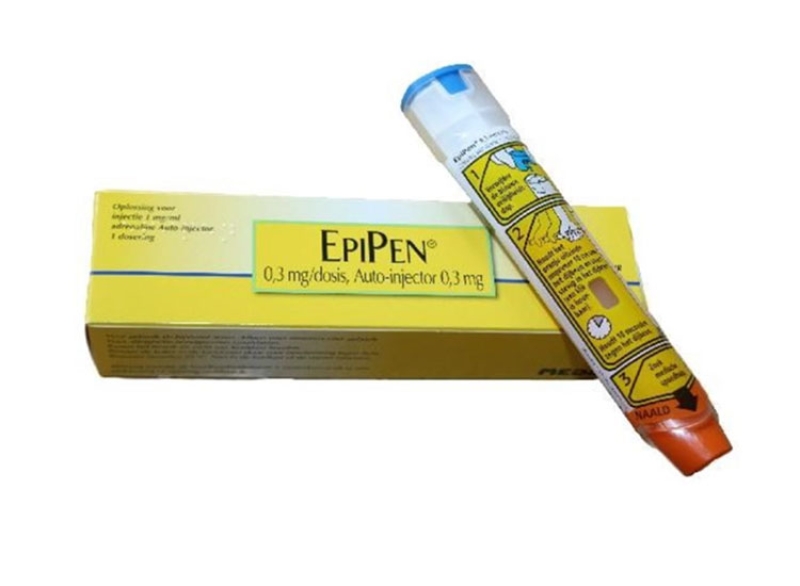Epipen Auto Injector

* Images for illustrative purposes only
* Brand supplied may vary depending on stock availability
Same-day Service Available
Same-day service available for additional £10, conditions apply.

* Images for illustrative purposes only
* Brand supplied may vary depending on stock availability
Same-day service available for additional £10, conditions apply.
No appointment or long waiting times
Your information always remains private
All our doctors & pharmacists are qualified & based in the UK
Dispensed by our UK partner pharmacies


Choose from our treatment options or speak to the in-store pharmacist for advice

Complete our free online medical consultation to be reviewed by our Clinical Team

We will notify you when your medication is ready for collection
A person who is having an allergic reaction should use their EpiPen® immediately if they experience ANY of the following serious symptoms of anaphylaxis following contact with their allergen:
EpiPen can be life-saving for people who experience severe allergic reactions (anaphylaxis). The EpiPen should take effect as soon as it is injected into the body. However, you should also call 999 when you have a severe allergic reaction, to ensure that you get medical attention as quickly as possible.
All adrenaline pens contain epinephrine (commonly known as adrenaline), and each auto-injector contains a single dose of the medicine. Adrenaline auto-injectors work by administering a dose of adrenaline into the body. The adrenaline helps to reduce the symptoms of anaphylaxis by causing blood vessels to narrow and by opening up the airways.
Anyone who suffers from severe allergies and is at risk of an anaphylactic reaction should ensure they have two adrenaline auto-injectors with them at all times. You should be trained in the correct use of your EpiPen, as should your close friends, family, and colleagues so that they can administer it if you are unable to do so yourself.
Follow the instructions given to you when you were first prescribed an EpiPen. Each EpiPen also comes with full instructions on how to use it. You should familiarize yourself with how to use an EpiPen regularly.
Check out the following Epipen website for a video illustration of how to use the Epipen:
https://www.epipen.co.uk/en-gb/patients/your-epipen/how-to-use-your-epipen
A person who is having an allergic reaction should use their EpiPen® immediately if they experience ANY of the following serious symptoms of anaphylaxis following contact with their allergen:
Follow the instructions below to ensure appropriate use of this medication:
Always use this medication exactly as your clinician has told you. Check with our clinical team or your GP or pharmacist if you are not sure.
Medicines and their possible side effects can affect individual people in different ways. The following are some of the side effects that are known to be associated with this medicine. Just because a side effect is stated here, it does not mean that all people using this medicine will experience that or any side effect.
Side effects of anaphylaxis treatment could include:
However, these side effects usually subside quickly, especially if the patient rests.
For full information on side effects and correct use, see the patient information leaflet. If any side effects concern you, or you are experiencing any of the side effects mentioned in the patient information leaflet whilst taking this medication, please contact our clinical team or speak to your GP.
EpiPen should only be injected into the anterolateral aspect of the thigh, NOT ANY OTHER PART OF THE THIGH OR BUTTOCK. The outer thigh is the safest site for Intramuscular (IM) injection as there is minimal risk of injection into major blood vessels or nerves in this area.
Intravascular injection (which is possible on the front of the thigh) could lead to acute cardiovascular compromise. Injection into a major nerve (which could occur on the posterior thigh or buttock) can cause significant damage; also, injection into the buttock may not be effective for a severe allergic reaction.
Accidental injection into the hand, particularly the digits, can cause serious injury and possibly gangrene. This injury needs to be urgently assessed and treated in an emergency room.
EpiPen® should be used with caution in patients with high blood pressure and thyroid conditions (as side effects can last longer) and in pregnancy; furthermore, sensitization of the heart to catecholamines may occur in patients with uncontrolled hyperthyroidism or those using cocaine. Blood sugar may increase in patients with diabetes and symptoms can temporarily get worse in patients with Parkinson’s disease.
Overdose of adrenaline is unlikely with EpiPen®. However, symptoms of overdose are elevated arterial pressure, pulmonary oedema and cardiac arrhythmias. If necessary, pressor effects may be counteracted by rapidly acting vasodilators or alpha-adrenergic blocking drugs.
It is important to remember that in practice there are no known contraindications to IM adrenaline use in a life-threatening allergic reaction.
It is important that you let us know which prescription, over-the-counter medicines and recreational drugs you are currently taking. You must also tell us about any other medical conditions that you currently have (or had in the past). This will help us ensure the prescribed medication is safe and appropriate for you to take.
For full information on warnings, medication interactions and contraindications, refer to the Patient Information Leaflet. Please read all packaging and the Patient Information Leaflet before taking any new medicine and inform our clinical team or your GP of medicines you are taking or intend to take.





